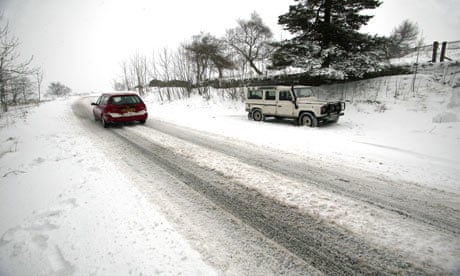As Britain prepares this weekend for a Siberian blast, councils across the country will be anxiously checking their betting slips.
The increasing cost of keeping roads open during harsh winter weather has forced councils to make spread bets to offset the risk of big financial losses. Weather derivatives – financial contracts that pay out in cases of extreme weather – are being actively tested by councils across the country.
The recent succession of historically cold winters, followed this year by what may prove to be the warmest winter on record, has fuelled concern among council strategists. Guardian research has revealed that in the last two years, councils nationwide have overspent on their winter budgets by up to 100%.
Dave Simpson, head of finance for strategy and communities at Lincolnshire county council, said: "We are looking at derivatives on a trial basis. Last year, we would have saved £1.5m. Derivatives could help generate considerable savings; this is very important to us during these difficult economic times.
"However, usage [of derivatives] could also potentially be an additional cost. With the mild winter this year we would so far have been out of pocket."
Derivatives are widely used in the private sector, especially the leisure, agricultural, energy and construction industries, to safeguard businesses. The worldwide weather derivatives market is worth more than £7bn.
A council would be offered a certificate for a fee that would pay out a fixed sum for each day that the thermometer dips below a specified mark. For example, in Lincolnshire the contract could pay out £40,000 for each night of freezing temperatures after the first 42 of the winter.
West Sussex county council, which overspent £300,000 on a winter budget of £1.5m last year, has hedged with an advanced fixed five-year lump-sum deal. Richard Speller, the council's winter service manager, said: "We have agreed a deal with Balfour Beatty on a fixed five-year agreement. This is the first winter of the contract and it has passed the risk to them.
"This time last winter we had been out to operate [gritting lorries] 53 times. This year it has been 13," Speller said. When a typical nightly gritting run can use more than 2,000 litres of diesel and costs £15,000, the risk to precarious council finances is obvious.
Despite opting for a fixed-sum model, West Sussex council believes derivatives are here to stay. "All councils have to look at derivatives," Speller said. "It makes sense to balance the risk. For us, this year, it was a step too far."
The hedging scheme is being offered to councils by Gritit, a winter risk-management specialist, in partnership with a Swiss weather derivatives company, Celsius Pro.
Jason Petsch, commercial director of Gritit, said: "Derivatives are used by the private sector for a simple reason: because they make financial sense. They mitigate risk.
"The country has faced many years of volatile winter weather and this comes at a public cost. We are in discussions with councils across the country about the employment of derivatives. It is only a tiny part of our overall business. However, in austere times there is a moral public duty to address this."
Contracts differ around the country but a typical derivative certificate for the winter would cost £185,000, providing a maximum of £1m of cover. In the Lincolnshire trial, a number of certificates are being issued to establish the different payouts under the scheme if it went ahead with a purchase.
Winter maintenance budgets have long proved to be a struggle for councils. Freedom of Information Act requests have revealed some striking figures:
South Lanarkshire council had a 2008-09 winter budget of £2.9m but ended up spending £4.9m. In 2009-10 its winter budget was £2.9m; it spent £5.7m.
Perth & Kinross council had a winter budget for 2009-10 of £2.9m. The actual spend was £4.9m. In 2010-11 its budget remained at £2.9m but the spend reached £5.2m.
Suffolk county council had a winter budget of £2.3m in 2009-10. The actual spend was £3.3m. The council's budget in 2010-11 was £2.37m – again, it spent more than £3m.
However, despite the huge degree of overspending, many industry figures are urging a cautious reaction.
Petsch, of Gritit, said: "Winter cost management is different to other council areas. Weather is volatile and absolutely unpredictable. After two horrific years, who would have anticipated this winter?
"Yet it is for that very reason that councils risk looking foolish by not hedging their bets. Derivatives are a gamble – but avoiding their usage may be the biggest risk of all."
